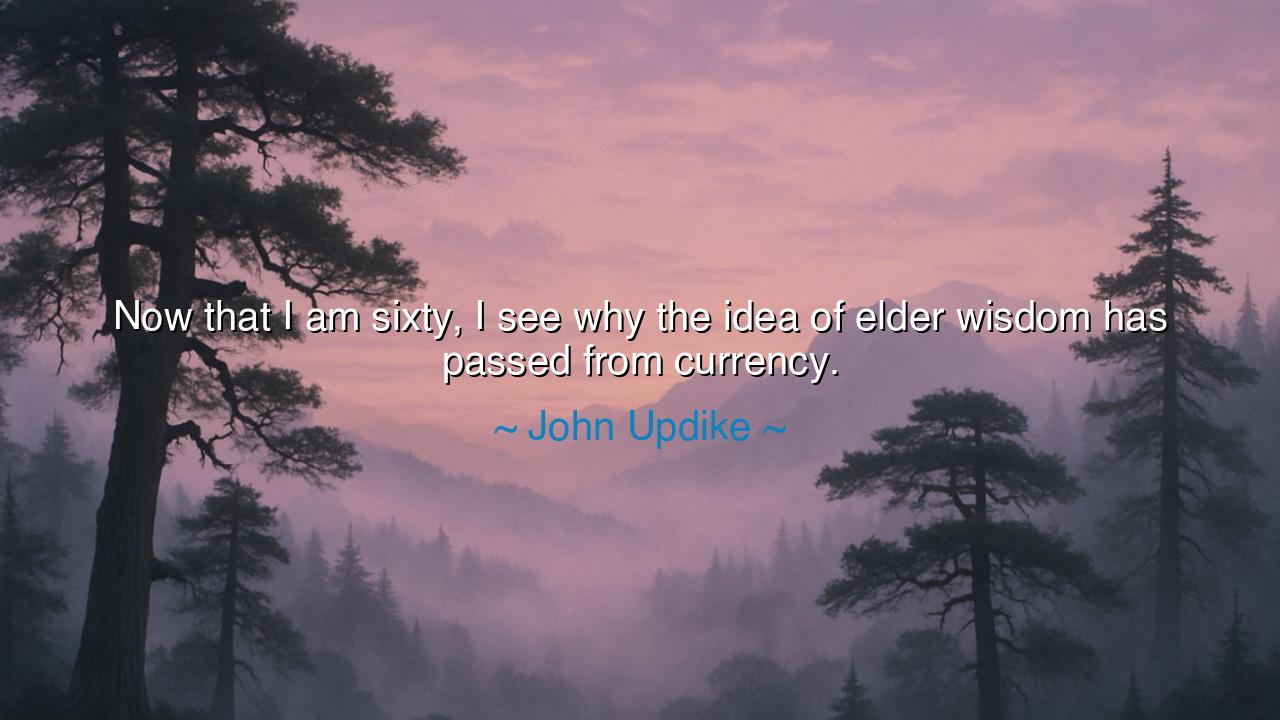
Now that I am sixty, I see why the idea of elder wisdom has






Hearken, children of the ages, to the reflective words of John Updike, who confided: “Now that I am sixty, I see why the idea of elder wisdom has passed from currency.” In this utterance lies the solemn truth of time, perception, and the fleeting regard for experience. As the years advance, the elders, once revered for their insight and counsel, find that their wisdom is often overlooked, undervalued, or dismissed by the vigor and ambition of youth. The currency of guidance, once abundant and honored, wanes in the face of new priorities and shifting values.
Updike speaks to the paradox of age and recognition. Those who have traversed the long journey of life carry knowledge forged in struggle, reflection, and triumph; yet the world often esteems speed, novelty, and the appearance of success over the depth of understanding. Elder wisdom, though profound, is no longer held as the standard of judgment, and the lessons of time lose their weight in the marketplace of thought.
Consider the life of Socrates, who in his later years walked the streets of Athens, seeking to impart the truths gleaned from a lifetime of inquiry. Though he possessed profound insight, many in his city disregarded his counsel, favoring youthful bravado and conventional opinion. Even the wisest are not always heeded, and Updike’s observation mirrors this ancient lament: the authority of age and experience may fade even while its substance remains unassailable.
Yet within this reflection lies guidance for both the aged and the young. To those who have lived, there is the quiet charge to continue sharing their insight, even when it is unrecognized, for the seeds sown in thought may bear fruit long after the moment has passed. And to the young, there is the lesson of humility: to value the perspectives of those who have walked paths previously trodden, for in their counsel lies both caution and illumination.
Updike’s words remind us that the passage of time brings both clarity and disenchantment. Elder wisdom, though often undervalued, carries truths that cannot be gained through fleeting experience alone. The insight of decades is a treasure, rich with understanding of human nature, the world, and the subtle currents that shape lives and communities.
Carry this teaching, children of generations yet to come: honor those who have walked before you, for wisdom, though out of fashion, remains eternal. Listen to the counsel of elders, weigh their experience, and allow their understanding to guide your steps. For in valuing their insight, you may reclaim a currency far richer than that which the world now counts: the enduring wealth of discernment, prudence, and truth.






XLXinh Linh
I can’t help but see this as a comment on cultural shifts. Older generations once held moral and practical authority, but now, younger voices dominate public discourse. Is this because society evolves too quickly for long-term experience to stay relevant? Or is it because age reveals how transient and personal wisdom really is? I’m curious whether Updike mourns the loss of elder influence, or accepts it as a natural consequence of progress.
PHMan Phan Hue
What strikes me here is the self-awareness. Updike seems to suggest that with age comes not certainty, but humility. I wonder if he means that elders realize how little control or understanding they ever had, and that this realization undermines the myth of wisdom. Is true wisdom then about accepting limitations rather than claiming knowledge? That interpretation feels both sobering and profoundly human. Perhaps wisdom is quieter than we think.
MDMinh Dinh
This quote feels tinged with both irony and melancholy. It makes me question how generational respect has changed—do younger people truly value the insights of those who’ve lived longer, or has technology made older perspectives seem obsolete? Maybe Updike is commenting on how wisdom itself has been redefined, shifting from reflection and patience to adaptability and innovation. Is elder wisdom still relevant in a world that prizes constant reinvention?
TBbinh dang thai binh
I find this statement oddly humbling. It suggests that getting older doesn’t necessarily mean becoming wiser—just more aware of life’s complexities. Could it be that wisdom isn’t lost but simply less certain, less absolute than we once believed? Maybe the more we live, the more we realize how little we actually understand. I’d love to know whether Updike saw this as a loss or as a kind of liberation from illusion.
TLTrieu Thi Luu
This line makes me pause and reflect on how society perceives aging. Has modern culture, with its obsession for youth and speed, made the experience of elders seem outdated? I wonder if Updike is admitting that age doesn’t automatically bring clarity or wisdom. Maybe he’s recognizing that mistakes and confusion persist, no matter how old we get. Does wisdom truly fade with time, or has the world just stopped listening to it?